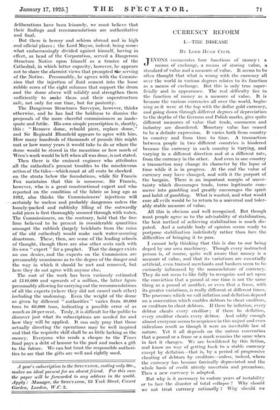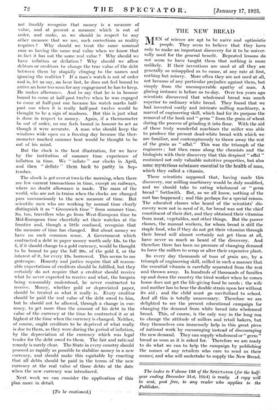CURRENCY REFORM
L—TIIE DISEASE
BY LORD VIGIL CECIL
JEVONS enumerates four functions of money : a means of exchange, a means of storing value, a standard of value and a measure of value. It seems to be often thought that what is wrong with the currency all over the world in various degrees relates to its function as a means of exchange. But this is only true super- . ficially and in appearance. The real difficulty lies in the function of money as a measure of value. It is because the various currencies all over the world, begin- ning as it were at the top with the dollar gold currency, and going down through different degrees of depreciation to the depths of the German and Polish marks, give quite different measures of value that trade, commerce and industry are disordered. Monetary value has ceased to be a definite expression. It varies both from country to country and from time to time. A transaction between people in two different countries is hindered because the currency in each country is varying, and varying in a different direction and at a different rate, from the currency in the other. And even in one country a transaction may change its character by the lapse of time -while it is in progress. At the end the value of currency may have changed, and with it the purport of the bargain. There is an important margin of uncer- tainty which discourages trade, turns legitimate com- merce into gambling and greatly encourages the spirit and habit of gambling. What is wanted, and what would cure all evils would be to return to, a universal and toler- ably stable measure of value.
All this is obvious and well recognized. But though most people agree as to the advisability of stabilization, the best method of achieving stabilization is much dis- puted. And a notable body of opinion seems ready to postpone stabilization indefinitely rather than face the difficulties of bringing it to pass.
I cannot help thinking that this is due to our being duped by our own machinery. Though every instructed person is, of course, quite well aware that money is a measure of value, and that its variations are essentially artificial, even trained merchants and bankers seem to he curiously influenced by the nomenclature of currency. They do not seem to like fully to recognize and act upon the conviction that a pound at one time is not the same thing as a pound at another, or even that a franc, with its greater variations, is really different at different times. The processes which we call inflation and deflation depend on a convention which enables debtors to cheat creditors, or creditors to cheat debtors. If there be inflation, every debtor cheats every creditor ; if there be deflation, every creditor cheats every debtor. And oddly enough almost everyone seems to acquiesce in this unjust and even ridiculous result as though it were an inevitable law of nature. Yet it all depends on the untrue convention that a pound or a franc or a mark remains the same when in fact it changes. We arc bewildered by this fiction, and know no way of getting back- to a stable currency except by deflation—that is, by a period of progressive cheating of debtors by creditors—unless, indeed, where the currency has become farcically depreciated and the whole basis of credit utterly uncertain and precarious. Then a new currency is adopted.
But why is it necessary to endure years of instability or to face the disaster of total collapse ? Why should we not treat currency rationally ? Why should we not frankly recognize that money is a measure of value, and - at present a measure . which is out of order, and make, as we should in respect to any other measure that we use, such corrections as reality requires ? Why should we treat the same nominal sum as having the same real value when we know that in fact it has not the same real value ? Why should we have inflation or deflation ? Why should we allow debtors or creditors to change the true value of the debt between them by stupidly clinging to the names and ignoring the realities ? If a man's watch is out of order and is, let us say, an hour fast, he does not feel bound to arrive an hour too soon for any engagement he has to keep. He makes allowance. And to say that he is in honour bound to come at half-past twelve when he was engaged to come at half-past one because his watch marks half- past one when it is really half-past twelve would be thought to be a sign of madness. But this is just what is clone in respect to .money. Again, if a thermometer be out of order, no one feels bound in honour to act as though it were accurate. A man who should keep the windows wide open on a freezing day because the ther- mometer marked summer heat would be thought to be out of his mind.
But the clock is the best illustration, for we have by the institution of summer time experience of inflation in time. We " inflate " our clocks in April, and then " deflate " them back to parity in Sep- tember.
The shock is got over at two in the morning, when there are few current transactions in time, except on railways, where no• doubt allowance is made. The mass of the world, who are not in trains when the clocks are changed pass unconsciously to the new measure of time. But scientific men who are working by normal time clearly distinguish it as " Greenwich time " from summer time. SO, too, travellers who go from West-European time to Mid-European time cheerfully set their watches at the frontier and, though a little confused, recognize that the measure of time has changed. But about money we have no such common sense. A Government which contracted a debt in paper money worth only 13s. to the if it should change to a gold Currency, would be thought to be bound to pay the full 20s. of the gold or the interest of it, for every 13s. borrowed. This seems to me grotesque. Honesty and justice require that all reason- able expectations of creditors should be fulfilled, but they certainly do not require that a creditor should receive what he never expected to receive and what, the bargain being reasonably understood, he never contracted to receive. Money, whether gold or depreciated paper, should be treated as what it really is. Every creditor should be paid the real value of the debt owed to him, but he should not be allowed, through a change in cur- rency, to get more than the amount of his debt in the value of the currency at the time he contracted it or at highest at the time when the currency is changed. Neither, of course, ought creditors to be deprived of what really is due to them, as they were during the period of inflation, by the depreciation of the currency which was legal tender for the debt owed to them. The fair and -raticnal remedy is surely clear. The State in every country should proceed as rapidly as possible to stabilize money in a new currency, and should make this equitable by enacting that all debts should be paid in the terms of the new currency at the real value of those debts at the date When the new currency was introduced.
Next week we can consider the application of this plan more in detail.
-(To be continued.)-











































 Previous page
Previous page